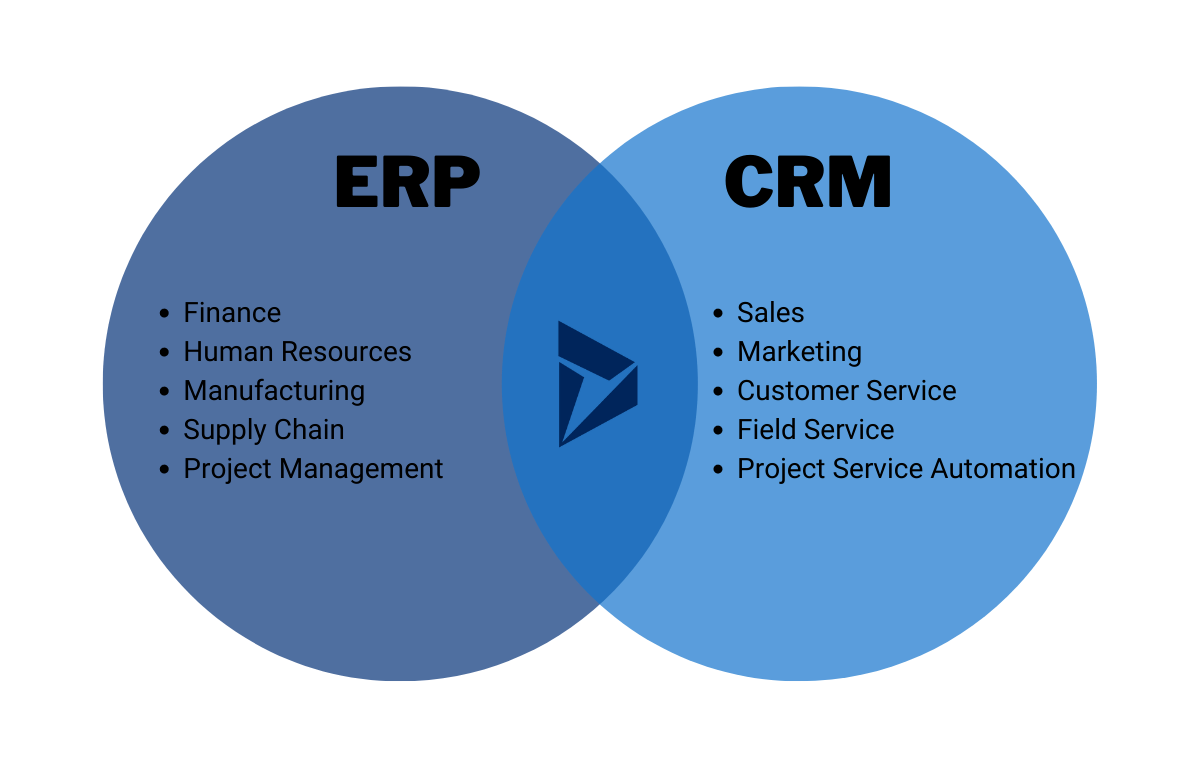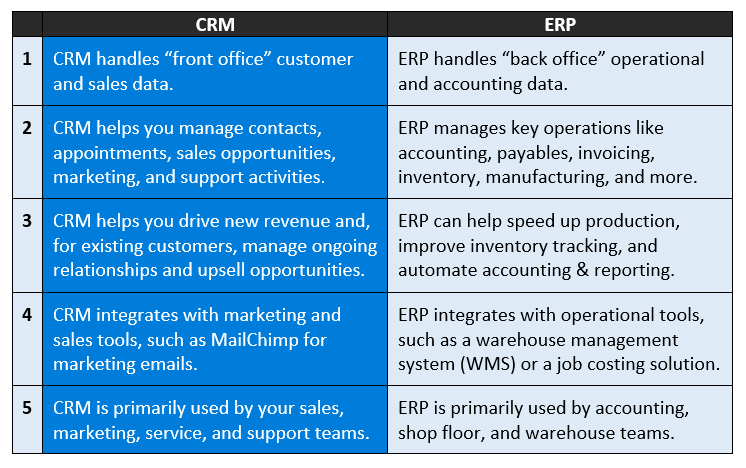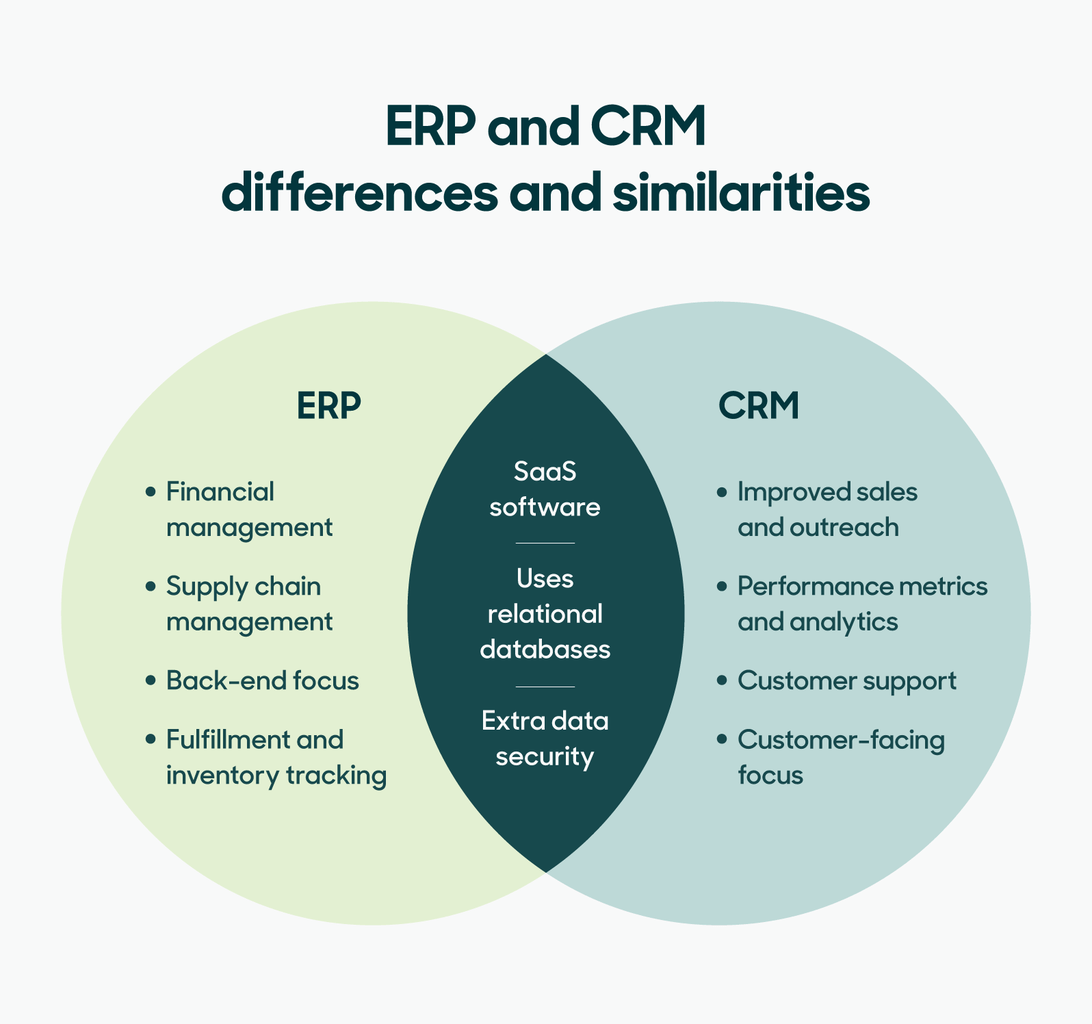CRM and ERP software serve different business needs. CRM focuses on customer relationships, while ERP manages business processes.
Understanding the difference between CRM and ERP software can help you choose the right tools for your business. CRM (Customer Relationship Management) software helps companies manage interactions with current and potential customers. It aims to improve customer service, drive sales, and boost customer retention.
ERP (Enterprise Resource Planning) software, on the other hand, integrates core business functions like finance, HR, and supply chain into one system. It aims to streamline processes and improve efficiency across the organization. Knowing these distinctions is crucial for making informed decisions that best support your business goals. In this blog, we’ll explore these differences in more detail.
Introduction To Crm And Erp
When navigating the world of business software, you might have come across the terms CRM and ERP. Both are pivotal in their own right, but understanding the nuances between the two can help you make an informed decision for your business needs. In this blog post, we will break down the basics and differences between CRM and ERP software. Let’s dive into the foundational aspects of each system.
Defining Crm
CRM stands for Customer Relationship Management. At its core, CRM software is designed to help businesses manage their interactions with current and potential customers. Think of CRM as a digital notebook that tracks and organizes all your customer data.
- Stores contact information
- Tracks customer interactions
- Manages sales pipelines
- Helps in marketing campaigns
For example, imagine you own a bakery. A CRM system can remind you of a customer’s birthday so you can send them a special discount. It’s all about keeping customers happy and improving relationships.
Defining Erp
ERP stands for Enterprise Resource Planning. This software is like the Swiss Army knife of business operations. It integrates various business processes into a single system, making it easier to manage day-to-day activities.
- Handles inventory management
- Streamlines financial operations
- Coordinates supply chain processes
- Manages human resources
Picture ERP as the backbone of your bakery. It tracks your ingredient levels, manages payroll, and even helps with accounting. It’s about optimizing efficiency and ensuring everything runs smoothly.
By now, you should have a clearer picture of what CRM and ERP are. In the next sections, we will explore their key differences and how they can be used together to benefit your business. Stay tuned!
Core Functions Of Crm
Understanding the core functions of CRM software can help businesses improve their customer interactions. CRM systems are designed to manage relationships with customers. They help businesses keep track of every interaction and improve customer satisfaction.
Customer Relationship Management
Customer Relationship Management (CRM) focuses on managing a company’s interactions with current and potential customers. It involves using data to understand customer behavior and preferences. This helps businesses provide personalized experiences and build stronger relationships.
CRM software stores customer information in a centralized database. This includes contact details, purchase history, and communication logs. Employees can access this information to provide better customer service.
Sales And Marketing Automation
Sales and marketing automation are key features of CRM software. Automation tools help businesses streamline repetitive tasks. This frees up time for employees to focus on more important activities.
For sales teams, CRM systems can automate tasks such as lead scoring and follow-ups. This ensures that no potential customer is overlooked. It also helps in tracking the sales pipeline and forecasting future sales.
For marketing teams, CRM software can automate email campaigns and social media posts. It allows businesses to segment their audience and target them with personalized messages. This increases the effectiveness of marketing efforts.
Core Functions Of Erp
Understanding the core functions of ERP is crucial when diving into the world of enterprise software. ERP, or Enterprise Resource Planning, is designed to streamline various business processes into one unified system. But what exactly does this mean, and how does it benefit your business? Let’s dive into the details with a focus on the main functions of ERP software.
Enterprise Resource Planning
At its heart, ERP is all about improving efficiency. It integrates all the essential functions of your business into a single system. Think of it as the Swiss Army knife of business tools – it does everything! From finance to human resources, inventory to customer relations, ERP systems handle it all.
For example, imagine trying to manage your business without a central system. You’d have separate software for accounting, another for payroll, and yet another for inventory. This can lead to chaos. ERP pulls all these functions together, providing a holistic view of your business operations.
Business Process Integration
One of the standout features of ERP is its ability to integrate business processes. This means that data flows seamlessly between different departments. No more manual data entry or miscommunication between teams.
- Financial Management: ERP systems offer robust financial management tools. This includes real-time tracking of financial transactions, budgeting, and forecasting.
- Human Resources: Managing employees is a breeze with ERP. It handles recruitment, payroll, performance reviews, and more.
- Supply Chain Management: ERP ensures that your supply chain is running like a well-oiled machine. It tracks inventory levels, orders, and deliveries.
With everything integrated, your business runs smoother, and you can make better decisions based on real-time data. It’s like having a crystal ball that shows you exactly what’s happening across your entire organization.
So, why should you care about ERP? Well, if you’re tired of juggling multiple systems and want to see your business operations in one place, ERP is your answer. It simplifies, integrates, and, most importantly, boosts efficiency.
Got any questions or thoughts on ERP? Drop a comment below, we’d love to hear from you!

Credit: www.calsoft.com
Key Differences
Understanding the key differences between CRM and ERP software can help businesses choose the right tools for their needs. While both systems aim to improve business operations, they serve different purposes and target different users.
Focus Areas
CRM software focuses on managing customer relationships. It helps businesses track interactions, sales, and customer support. The main goal is to enhance customer satisfaction and loyalty.
ERP software, on the other hand, manages internal processes. It integrates all aspects of a business, such as finance, human resources, and supply chain. The aim is to streamline operations and improve efficiency.
Target Users
CRM software is mainly used by sales, marketing, and customer service teams. These users rely on CRM tools to engage with customers and track sales activities.
ERP software is used by various departments across an organization. This includes finance, HR, procurement, and production teams. These users need ERP tools to manage their specific functions and ensure smooth operations.
Benefits Of Crm
Customer Relationship Management (CRM) software offers numerous benefits to businesses. It helps manage interactions with current and potential customers. This leads to improved customer satisfaction and increased sales. Let’s explore some key benefits of CRM software.
Improved Customer Relationships
CRM software helps store customer information in one place. This includes contact details, purchase history, and preferences. It allows businesses to personalize their communication. Personalized communication makes customers feel valued. Happy customers are more likely to stay loyal. This builds trust and long-term relationships.
Enhanced Sales Performance
CRM tools help track sales activities and performance. They provide insights into which sales strategies work best. This helps sales teams focus on the right opportunities. Automated reminders ensure follow-ups with potential customers. This increases the chances of closing deals. Sales teams can also track their targets and achievements.
Benefits Of Erp
ERP software offers a range of benefits for businesses. It helps improve efficiency and productivity. By integrating various functions into a single system, ERP software provides a holistic view of the business. This section will explore some key benefits of ERP.
Streamlined Operations
ERP software helps streamline operations. It integrates all business processes into one system. This reduces the need for manual data entry. It also minimizes errors. Employees can access real-time data. This improves decision-making and response times.
ERP systems automate routine tasks. This frees up time for employees. They can focus on more important tasks. As a result, businesses see increased efficiency and productivity.
Better Resource Management
ERP software enhances resource management. It provides insights into inventory levels, production schedules, and supply chain activities. This allows businesses to optimize resource use.
With ERP, companies can track and manage their resources effectively. This includes human resources, materials, and equipment. Proper resource management leads to cost savings. It also ensures that the right resources are available when needed.
Overall, ERP software supports better planning and forecasting. This helps businesses stay competitive in the market.
Choosing Between Crm And Erp
Choosing between CRM and ERP software is crucial for your business. Both systems serve distinct purposes and cater to different needs. Understanding which one fits your business can drive growth and efficiency.
Business Needs Analysis
To decide between CRM and ERP, start with a business needs analysis. Identify your primary business challenges and goals. A CRM focuses on customer relationships and sales. It helps manage customer interactions and track sales leads. An ERP, on the other hand, integrates core business processes. It includes functions like finance, human resources, and supply chain management. Determine which system aligns better with your business needs.
Scalability Considerations
Scalability is another important factor in choosing CRM or ERP. Assess your business growth plans and future needs. CRM systems are ideal for businesses looking to expand their customer base. They grow with your sales and marketing efforts. ERP systems are more suited for businesses planning to scale their operations. They handle increased complexity in business processes. Choose the system that supports your long-term goals.

Credit: www.customerization.ca
Integrating Crm And Erp
When it comes to business management software, two major players often come to mind: CRM (Customer Relationship Management) and ERP (Enterprise Resource Planning). While both systems are pivotal, understanding the difference between them and how they work together can provide immense value to your business. This post will focus on the benefits of integrating CRM and ERP systems, showcasing how this combination can revolutionize your operations.
Unified Data Management
Imagine a world where all your customer and business data are housed in one place. Sounds like a dream, right? Well, integrating CRM and ERP can make this dream a reality. With unified data management, you can:
- Reduce Data Silos: No more jumping between systems to gather information. All your data lives in one central repository.
- Enhance Data Accuracy: With a single source of truth, the chances of encountering conflicting or duplicate data diminish significantly.
- Streamline Operations: Unified data means that your teams can work more efficiently, accessing the information they need swiftly.
For example, when your sales team closes a deal using CRM, the ERP system can automatically update inventory levels and initiate order processing. This seamless flow of information minimizes errors and maximizes productivity.
Improved Business Intelligence
Another compelling advantage of integrating CRM and ERP is the boost in business intelligence. With both systems working in tandem, you get a 360-degree view of your operations and customer interactions. Here’s how:
- Enhanced Reporting: Integrated systems provide comprehensive reports that combine data from various departments, offering deeper insights.
- Informed Decision-Making: Access to real-time data means that decision-makers can make informed choices quickly and accurately.
- Predictive Analytics: With all your data in one place, leveraging predictive analytics becomes easier, helping you forecast trends and make proactive decisions.
For instance, let’s say your marketing team launches a new campaign. With integrated CRM and ERP, you can track the campaign’s impact on sales, inventory, and customer satisfaction, providing a holistic view of its success.
Integrating CRM and ERP isn’t just a technical upgrade; it’s a strategic move that can propel your business into a new era of efficiency and intelligence. By unifying data management and enhancing business intelligence, you’re setting the stage for smarter, more agile operations. So, are you ready to take the leap and bring your systems together?
Case Studies
Understanding the differences between CRM and ERP software can be challenging. One effective way to grasp these differences is through real-world case studies. Case studies provide practical insights into how businesses implement CRM and ERP systems. They illustrate the tangible benefits and challenges faced during these implementations.
Successful Crm Implementations
A well-known retail chain wanted to enhance its customer relationships. They implemented a CRM system to track customer interactions, preferences, and purchase history. This helped the company personalize marketing campaigns and improve customer service. As a result, customer satisfaction and retention rates increased significantly.
Another example involves a financial services firm. They used CRM software to streamline their sales process. The system provided a centralized database for all customer information. It enabled sales teams to access real-time data and collaborate more efficiently. This led to a 20% increase in sales and improved client relationships.
Successful Erp Implementations
A manufacturing company faced issues with inventory management and production planning. They chose to implement an ERP system to integrate all their business processes. The ERP solution helped them monitor inventory levels, manage orders, and optimize production schedules. This resulted in reduced operational costs and improved productivity.
An educational institution sought to improve its administrative operations. They adopted an ERP system to manage student records, financials, and human resources. The integrated system provided a unified platform for data management. It streamlined workflows and enhanced decision-making capabilities. The institution reported increased efficiency and better resource allocation.

Credit: www.top-sage-resellers.com
Future Trends
CRM and ERP software continue to evolve with emerging technologies. These advancements promise to bring more efficiency and capabilities. Let’s explore the future trends shaping these systems.
Ai And Automation
AI and automation are transforming CRM and ERP software. AI can analyze customer behavior, predict trends, and personalize experiences. Automation streamlines repetitive tasks, saving time and reducing errors. These technologies enhance decision-making processes.
Cloud-based Solutions
Cloud-based solutions are becoming the norm for CRM and ERP software. They offer flexibility, scalability, and cost savings. Businesses can access data from anywhere, ensuring continuous operations. Cloud solutions also simplify updates and maintenance.
Frequently Asked Questions
What Is The Difference Between Crm And Erp Software?
CRM software focuses on managing customer relationships and sales. ERP software integrates and automates business processes across departments.
Is Salesforce A Crm Or Erp?
Salesforce is a CRM, not an ERP. It focuses on customer relationship management, sales, and marketing automation.
Can You Use Crm And Erp Together?
Yes, you can use CRM and ERP together. Integrating them enhances efficiency, streamlines processes, and improves customer satisfaction.
What Is The Role Of Erp In Crm?
ERP integrates and streamlines business processes. It supports CRM by providing accurate customer data, enhancing customer service and sales.
Conclusion
CRM and ERP software serve different purposes for businesses. CRM focuses on customer relationships, boosting sales and service. ERP manages internal processes, ensuring smooth operations. Choosing between them depends on your business needs. CRM helps grow customer bases. ERP optimizes workflows and resources.
Evaluate your goals to decide which software fits best. Both can complement each other for comprehensive management. Understanding their roles ensures you make an informed choice. Invest in the right tool to enhance your business efficiency.

